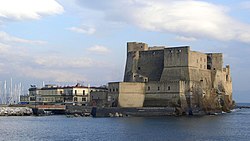20th G7 summit
| 20th G7 summit | |
|---|---|
 Official logo | |
| Host country | Italy |
| Dates | 8–10 July 1994 |
| Follows | 19th G7 summit |
| Precedes | 21st G7 summit |
The 20th G7 Summit was held in Naples, Italy, on 8–10 July 1994. The venue for the summit meetings was the former Royal Palace in Naples.[1]
The Group of Seven (G7) was an unofficial forum which brought together the heads of the richest industrialized countries: France, Germany, Italy, Japan, the United Kingdom, the United States, Canada (since 1976),[2] and the President of the European Commission (starting officially in 1981).[3] The summits were not meant to be linked formally with wider international institutions; and in fact, a mild rebellion against the stiff formality of other international meetings was a part of the genesis of cooperation between France's president Valéry Giscard d'Estaing and West Germany's chancellor Helmut Schmidt as they conceived the first Group of Six (G6) summit in 1975.[4]
Leaders at the summit
The G7 is an unofficial annual forum for the leaders of Canada, the European Commission, France, Germany, Italy, Japan, the United Kingdom, and the United States.[3]
The 20th G7 summit was the first summit for Canadian Prime Minister Jean Chrétien, Italian Prime Minister Silvio Berlusconi, and Japanese Prime Minister Tomiichi Murayama. It was also the last summit for French President François Mitterrand.
Participants
These summit participants are the current "core members" of the international forum:[5][1][6]
| Core G7 members Host state and leader are shown in bold text. | |||
| Member | Represented by | Title | |
|---|---|---|---|
| Canada | Jean Chrétien | Prime Minister | |
| France | François Mitterrand | President | |
| Germany | Helmut Kohl | Chancellor | |
| Italy | Silvio Berlusconi | Prime Minister | |
| Japan | Tomiichi Murayama | Prime Minister | |
| United Kingdom | John Major | Prime Minister | |
| United States | Bill Clinton | President | |
| European Union | Jacques Delors | Commission President | |
| Helmut Kohl | Council President | ||
Agenda

The first night of the summit included a working dinner for the international leaders. The event was organized in the dramatic setting of Castel dell'Ovo at the waters' edge of the Bay of Naples.[7]
Issues
The summit was intended as a venue for resolving differences among its members. As a practical matter, the summit was also conceived as an opportunity for its members to give each other mutual encouragement in the face of difficult economic decisions.[4] Issues which were discussed at this summit included:
- Jobs and economic growth
- Trade
- Environment
- Developing countries
- Nuclear safety
- Ukraine
- Russia
- Other countries in transition
- Cooperation against transnational crime and money laundering
Gallery of participating leaders
Core G7 participants
See also
Notes
- ^ a b Japan, Ministry of Foreign Affairs (MOFA): Summit Meetings in the Past.
- ^ Saunders, Doug. "Weight of the world too heavy for G8 shoulders," Archived 2008-10-11 at the Wayback Machine Globe and Mail (Toronto). July 5, 2008 -- n.b., the G7 becomes the Group of Eight (G7) with the inclusion of Russia starting in 1997.
- ^ a b Reuters: "Factbox: The Group of Eight: what is it?", July 3, 2008.
- ^ a b Reinalda, Bob and Bertjan Verbeek. (1998). Autonomous Policy Making by International Organizations, p. 205.
- ^ Rieffel, Lex. "Regional Voices in Global Governance: Looking to 2010 (Part IV)," Archived June 3, 2010, at the Wayback Machine Brookings. March 27, 2009; "core" members (Muskoka 2010 G-8, official site). Archived June 2, 2010, at the Wayback Machine
- ^ MOFA: Summit (20); European Union: "EU and the G8" Archived February 26, 2007, at the Wayback Machine
- ^ "Summit in Naples; Japan's Premier Is Hospitalized," New York Times. July 9, 1994.
References
- Bayne, Nicholas and Robert D. Putnam. (2000). Hanging in There: The G7 and G8 Summit in Maturity and Renewal. Aldershot, Hampshire, England: Ashgate Publishing. ISBN 978-0-7546-1185-1; OCLC 43186692
- Reinalda, Bob and Bertjan Verbeek. (1998). Autonomous Policy Making by International Organizations. London: Routledge. ISBN 978-0-415-16486-3; ISBN 978-0-203-45085-7; OCLC 39013643
External links
- No official website is created for any G7 summit prior to 1995 -- see the 21st G7 summit.
- University of Toronto: G8 Research Group, G8 Information Centre










